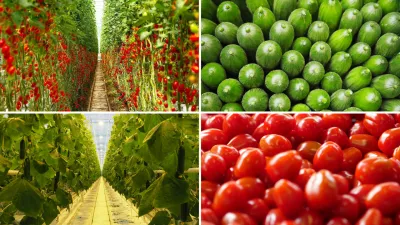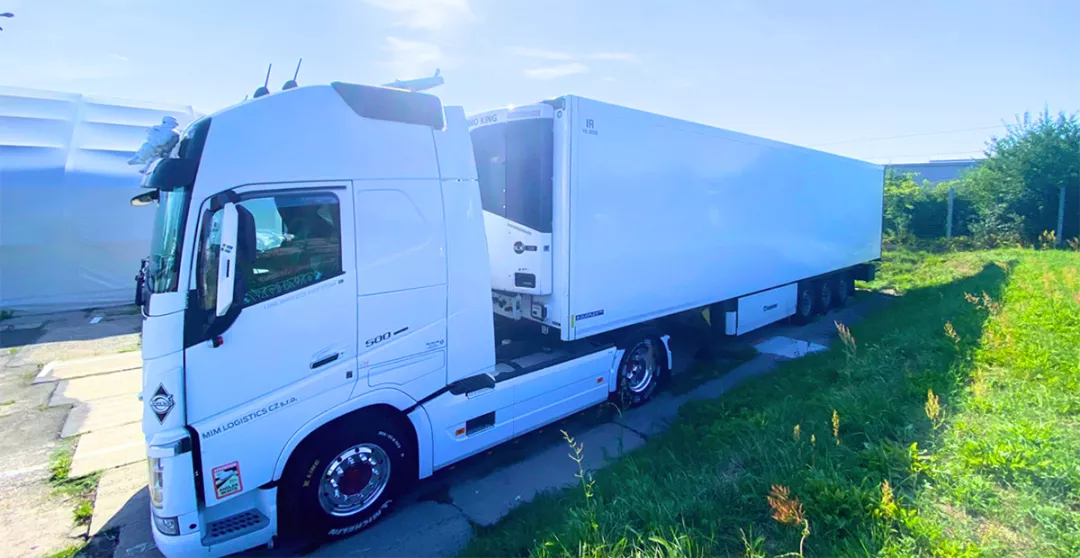General information
RDP Priority
- P3. Food chain and risk management
RDP Focus Area
- 3A: Agri-food chain integration & quality
RDP Measure
- M04: Investments in physical assets
Beneficiary type
- Farmer / land manager
Summary
Improving the efficiency of food supply chains through better distribution systems helps foster stronger relationships between producers and retailers. It can ultimately lead to better prices for both parties involved. Efficient transport logistics for food also ensure that healthy produce retains its nutritional value, as vitamins and minerals degrade over time.
Farma Bezdínek Limited has a 15 hectares (ha) hydroponic glasshouse farming business growing tomatoes in eastern Czechia. The company needed financial help to invest in its business development plans. This included improving distribution efficiency using CAP co-funding to purchase a refrigerated trailer and mobile shop.
Thanks to this investment, the firm can distribute tomatoes from its production greenhouse directly without a reseller to various retail chains. The mobile store provides new opportunities for direct sales building customer loyalty in the surrounding area through product branding.
Results
- The purchase of a refrigerated trailer and mobile shop allowed the beneficiary to operate more independently with more choice and flexibility when required.
- Using a mobile shop, the beneficiary can distribute its goods in the surrounding towns and villages directly to the final customer.

Promoter
Farma Bezdínek
Funding
Total budget 159 304 (EUR)
EAFRD: 32 585 (EUR)
National/Regional: 33 243 (EUR)
Private/own: 65 828 (EUR)
Other: 27 648 (EUR)
Ressources
Documents
Good practice report : Modernisation of the agricultural enterprise Farma Bezdínek
(PDF – 3.22 Mo)
Liens
Context
Distribution of fresh vegetables, such as tomatoes, plays a crucial role in supporting farm businesses and enhancing nutrition. Efficient delivery of food assists streamlined distribution networks that reduce post-harvest losses and maximise profit margins for farmers. Efficient transport logistics for food also ensure that healthy produce retains its nutritional value, as vitamins and minerals degrade over time.
By minimising spoilage through effective logistics, farmers can ensure that their products reach markets in optimal condition. This efficiency helps foster stronger relationships between producers and retailers. It can ultimately lead to better prices for both parties involved.
In eastern Czechia, a hydroponic glasshouse farming business growing tomatoes needed financial help to invest in its business development plans. This included improving efficiency during transport logistics. The beneficiary grows large volumes of tomatoes in its 15 ha hydroponic greenhouse and imports young tomato plants that it transports from the Netherlands. The vegetables are then grown using hydroponic farming in a modern greenhouse facility, like those popular with Dutch horticultural firms.
Plants bear fruits after about two months and harvesting continues over ten months. At the end of the growing period, the entire greenhouse is cleared before new plants start again. Ripe fresh fruit is packed in 250g, 500g or loose packs and delivered to individual retail chains.
Before the project started, the applicant did not own any vehicles and all the produce was delivered by dispatch companies, which then distributed the goods to retail chains. The beneficiary also did not own a mobile shop.
Objectives
Business development goals for the project focused on:
- Shortening the supply chain and becoming independent from external carriers.
- Building and strengthening brand awareness in the market by improving direct contact with end customers via the mobile shop.
- Supporting the 'local food for local consumers' principle and increasing awareness of sustainable and modern farming practices.
- Reducing carbon footprints through more efficient distribution.
Activities
The 159 000 EUR project budget covered the purchase of:
- One refrigerated trailer
- One mobile shop
Main results
- Thanks to the purchase of these investments, the beneficiary has become strongly independent from the dispatching companies and can distribute its production on its own with more choice and flexibility when required.
- Using the mobile shop, the beneficiary can distribute its goods in the surrounding towns and villages directly to the final customer.
Key lessons
- The project has demonstrated that investing in modern logistics to shorten supply chains significantly improves both the efficiency and quality of product distribution.
- Agricultural businesses can consider investing in their own logistics if they wish to increase their independence and improve the quality of service for their customers.
- Direct customer contact through the mobile shop has not only increased sales but also deepened the relationship between the farm and local communities.
- Efficient food delivery ensures that healthy produce retains its nutritional value, as vitamins and minerals degrade over time. Fresh tomatoes are rich in essential nutrients such as vitamin C and lycopene, which contribute to improved health outcomes for consumers. Thus, efficient distribution systems can promote public health, encourage consumption of locally sourced produce and boost farm business efficiency.
Thanks to this modernisation, we are able to offer our customers even fresher and higher-quality tomatoes directly from the farm, while also supporting local agriculture.
Contact Information
Project promoter: Farma Bezdínek
